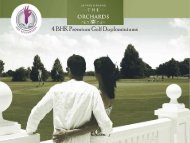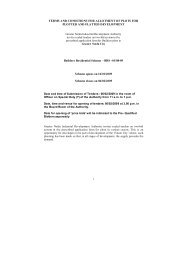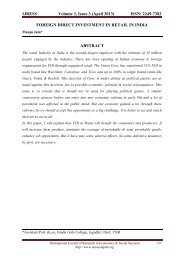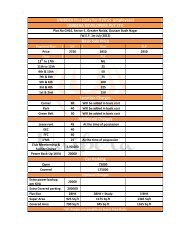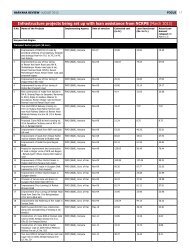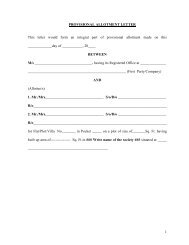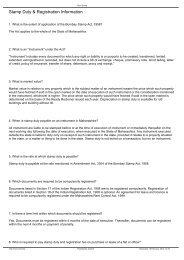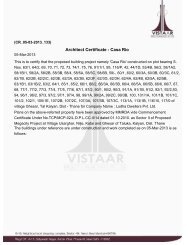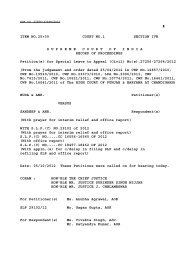eLegalix - Allahabad High Court Judgment Information System ...
eLegalix - Allahabad High Court Judgment Information System ...
eLegalix - Allahabad High Court Judgment Information System ...
You also want an ePaper? Increase the reach of your titles
YUMPU automatically turns print PDFs into web optimized ePapers that Google loves.
JUDGMENT/ORDER IN - WRIT - C No. 37443 of 2011 at <strong>Allahabad</strong> Dated-21.10....http://elegalix.allahabadhighcourt.in/elegalix/WebShow<strong>Judgment</strong>.doPage 184 of 19710/21/2011The respondents have also referred two judgment of the Apex <strong>Court</strong> dated 12.12.2008 by which order the SpecialLeave to Appeal Civil no.28731 of 2008 filed against the Division Bench <strong>Judgment</strong> of this <strong>Court</strong> dated 16.09.2008in writ petition no.38793 of 2008 was challenged. The Supreme <strong>Court</strong> by order dated 12.12.2008 dismissed theSpecial Leave Petition by following order:"Heard learned counsel for the petitioner. No merit. The special leave petition is dismissed"Learned counsel for the respondent sought to contend that since the Division Bench judgment of this court asmentioned above has been upheld by the Apex court by dismissing the special leave to appeal the said judgmenthaving approval of the Apex <strong>Court</strong> are binding precedent under Article 141.We have considered above submission of the learned counsel for the respondent. The orders of the Apex <strong>Court</strong>as quoted above were orders by which the Supreme <strong>Court</strong> dismissed the Special Leave Petition. The specialleave was not granted by the Apex <strong>Court</strong>. The dismissal of special leave petition was not by an speaking ordernor the Apex court considered any of the issues on merits nor any ratio can be culled out from the orders of theApex <strong>Court</strong> as quoted above. The Apex <strong>Court</strong> in 2000 (6) S.C.C. 359 Kunhayammed and others Vs. State ofKerala and another had occasion to consider the effect of dismissal at the stage of Special Leave by nonspeaking/speaking order. Apex court held that said order do not constitute any ratio within meaning of Article 141nor it attracts doctrine of merger, following was laid down by the Apex court in paragraph 27:" A petition for leave to appeal to this <strong>Court</strong> may be dismissed by a non-speaking order or by a speaking order.Whatever be the phraseology employed in the order of dismissal, if it is a non-speaking order, i.e. it does notassign reasons for dismissing the special leave petition, it would neither attract the doctrine of merger so as tostand substituted in place of the order put in issue before it nor would it be a declaration of law by the Supreme<strong>Court</strong> under Article 141 of the Constitution for there is no law which has been declared. If the order of dismissal besupported by reasons then also the doctrine of merger would not be attracted because the jurisdiction exercisedwas not an appellate jurisdiction but merely a discretionary jurisdiction refusing to grant leave to appeal. We havealready dealt with this aspect earlier. Still the reasons stated by the <strong>Court</strong> would attract applicability of Article 141of the Constitution if there is a law declared by the Supreme <strong>Court</strong> which obviously would be binding on all thecourts and tribunals in India and certainly the parties thereto. The statement contained in the order other than onpoints of law would be binding on the parties and the court or tribunal, whose order was under challenge on theprinciple of judicial discipline, this <strong>Court</strong> being the apex court of the country. No court or tribunal or parties wouldhave the liberty of taking or canvassing any view contrary to the one expressed by this <strong>Court</strong>. The order ofSupreme <strong>Court</strong> would mean that it has declared the law and in that light the case was considered not fit for grantof leave. The declaration of law will be governed by Article 141 but still, the case not being one where leave wasgranted, the doctrine of merger does not apply. The <strong>Court</strong> sometimes leaves the question (sic) open. Or itsometimes briefly lays down the principle, may be, contrary to the one laid down By the <strong>High</strong> <strong>Court</strong> and yet woulddismiss the special leave petition. The reasons given are intended for purposes of Article 141. This is so donebecause in the event of merely dismissing the special leave petition, it is likely that an argument could beadvanced in the <strong>High</strong> <strong>Court</strong> that the Supreme <strong>Court</strong> has to be understood as not to have differed in law with the<strong>High</strong> <strong>Court</strong>.The recent judgment of the Apex court in M/s. Royal Orchid Hotel Ltd. fully support the contention of thepetitioners that their rights are not affected by the Division Bench judgment of this <strong>Court</strong> upholding the notificationin which they were not party. In the aforesaid case the co-tenure holders of the tenure holders whose land wasacquired had filed writ petition in Karnataka <strong>High</strong> <strong>Court</strong> challenging the land acquisition which was dismissed.Special leave petition filed by them was also dismissed. Following was laid down by the Apex court in M/s. RoyalOrchid Hotel Ltd. and another Vs. G. Jayarama Reddy and others decided on 29.9.2011 in paragraph 24:"24. A reading of the impugned judgment, the relevant portions of which have been extracted hereinabove showsthat the Division Bench of the <strong>High</strong> <strong>Court</strong> adverted to all the facts, which had bearing on the issue of delayincluding the one that on the advice given by an advocate, respondent No.1 had availed other remedies andopined that the delay had been adequately explained. Thus, it cannot be said that the discretion exercised by the<strong>High</strong> <strong>Court</strong> to entertain and decide the writ petition filed by respondent No.1 on merits is vitiated by any patentlegal infirmity. It is true that the writ petitions filed by the brothers of respondent No.1 had been dismissed by thelearned Single Judge on the ground of delay and the writ appeals and the special leave petitions filed against theorder of the learned Single Judge were dismissed by the Division Bench of the <strong>High</strong> <strong>Court</strong> and this <strong>Court</strong>respectively, but that could not be made basis for denying relief to respondent No.1 because his brothers hadneither questioned the diversification of land to private persons nor prayed for restoration of their respectiveshares. That apart, we find it extremely difficult, if not impossible, to approve the approach adopted by the learnedSingle Judge in dealing with Writ Petition Nos. 2379 and 2380 of 1993 filed by the brothers of respondent No.1.




